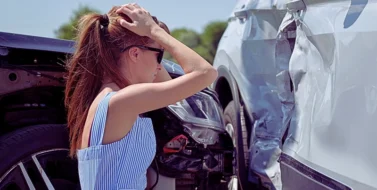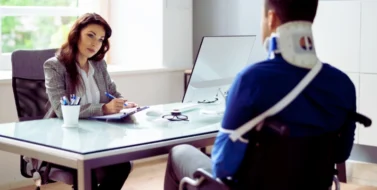If you’re dealing with persistent pain after a rear-end accident, you might be suffering from a traumatic facet joint injury. These injuries don’t always show up on X-rays, but they can cause serious long-term issues for car accident victims. Unfortunately, insurance companies will do everything they can to downplay them and minimize claim payouts.
If you’re still in pain after a crash but told your scans are normal, you’re not imagining it. These injuries are real—and we can help prove it. Call Lloyd Miller Law at 773-838-8100.
In the meantime, here’s what you need to know about these hidden spinal injuries, how facet joint injury happens in rear-end accidents, and what to do if the insurance company is pushing you to settle before the real damage is clear.
Table of Contents
Rear-End Accidents and Back Pain: What’s Really Going On?
After a rear-end collision, your body jolts forward and snaps back in a split second. That sudden “whiplash” motion puts extreme stress on the facet joints—the small joints along your spine that allow you to twist, turn, and bend.
Even in low-speed crashes, the force is enough to tear or inflame these joints. The result? Nagging pain that doesn’t go away, especially when you try to move.
What Are Facet Joint Injuries?
Facet joints sit between the vertebrae in your neck and back. They help stabilize the spine and control movement. When these joints are strained or compressed in a crash, they can:
- Swell and inflame
- Cause sharp or aching pain
- Trigger muscle spasms
- Limit mobility
Because the damage is internal and not always visible on imaging scans, these injuries often get labeled as “soft tissue” or dismissed entirely.
Why These Injuries Are Hard to Spot—But Easy to Miss in a Car Accident Claim
One of the most frustrating parts of dealing with a facet joint injury is that standard X-rays and even MRIs might not show the problem. That gives insurance adjusters ammunition to deny or downplay your claim, especially if there’s little visible vehicle damage.
They might argue:
- “It was a low-speed crash—you can’t be that hurt.”
- “Your medical records don’t show anything serious.”
- “You probably had back pain before the crash.”
Without a lawyer, you’re left trying to explain an injury that’s real—but invisible to the untrained eye.
Common Signs You May Have a Facet Joint Injury After a Crash
You don’t need a medical degree to recognize something isn’t right. After a rear-end accident, pay attention to:
- Pain in your neck or lower back that worsens with movement
- Difficulty turning your head or twisting your torso
- Stiffness or muscle spasms
- A deep ache that doesn’t improve with rest
If your back pain isn’t getting better—or keeps flaring up—you could be dealing with a traumatic facet joint injury.
How Insurance Companies Use “Invisible” Injuries Against You
Insurance companies know how expensive chronic back pain can get. That’s why they’ll try to shut down your claim early—before the full extent of your injuries is clear.
They may:
- Push you to settle fast
- Offer a lowball payment
- Blame your pain on aging, past injuries, or stress
They’re betting you won’t push back. That’s where a skilled personal injury lawyer makes the difference.
Why You Need a Car Accident Lawyer for a Facet Joint Injury
These injuries may not be obvious on paper, but the pain is real—and the long-term costs can be steep. From physical therapy and injections to lost work time, facet joint injuries are anything but “minor.”
An experienced car accident attorney can:
- Help connect you with the right doctors
- Build a case using your medical records, pain journal, and expert opinions
- Negotiate a fair settlement based on your actual suffering
- Fight back when insurers try to sweep your injury under the rug
Don’t let the insurance company decide what your pain is worth.
Get Help Today: Protect Your Rights After a Rear-End Crash
Still dealing with back pain after a rear-end collision? You’re not alone—and you’re not imagining it. Facet joint injuries are real, and without legal help, they’re often underdiagnosed and undercompensated.
At Lloyd Miller Law, we take these cases seriously. We’ll work to prove your injury, hold the insurance company accountable, and fight for the compensation you deserve.
Call 773-838-8100 contact us online for a free consultation. You don’t pay unless we win.





